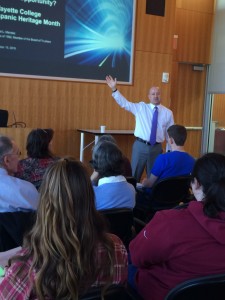Angel Mendez ’82 Engages Students in Discussion on the Hispanicization of America: Threat or Opportunity?

Angel Mendez speaks to audience of faculty, staff and students
America in 2015 has reached a demographic tipping point, according to Lafayette College Trustee Angel Mendez ’82, retired senior vice president, Cisco Transformation, Cisco Systems, Inc. From today’s 55 million Latinos, 17 percent of the U.S. population, to 129 million projected in 2060, 31 percent of the U.S. population, the economic impact of Hispanics is profound.
The U.S. is moving through a process of acceptance/awareness of the culture, involvement/learning about the culture, and integration/learning from the culture, a journey America is only partway through. Speaking to a packed room of students and faculty, Mendez challenged his audience to recognize and embrace the opportunities presented by this new reality.
Drawing on his experience as a Cuban-born, Puerto Rico-raised, naturalized citizen, Mendez reminded the audience that, in the charged political culture of late Fall 2015, the nation is talking about the wrong aspects of Hispanicization. Immigration is only part of the conversation.
For example, despite popular rhetoric, statistics show illegal immigration has actually been going down since its peak in 2005. Instead, fully half the Hispanic population in the U.S. today is comprised of people who were born in the country. According to Mendez, one-quarter of public school students and 21 percent of millennials are Hispanic.
This rapidly expanding group of young people–and the collective purchasing power it represents–has caught the attention of major companies such as Coca Cola, Proctor & Gamble, and HBO, companies that are sinking billions of dollars in advertising money into specifically Hispanic media. Univision, the Spanish language television station, ranked number one in broadcast TV among the crucial 18-49 year old demographic in 2013, a year in which the age of broadcast television viewers averaged 70.
In 2015, 31 million Latinos speak English proficiently, up from just 8 million in 1980. According to Mendez, a bilingual country is more informed than a monolingual one, and information breeds opportunity.
“Economic growth is at the heart of all good things,” Mendez asserted. For the country to grow and prosper, this one-third of the population must also grow and prosper. To achieve this prosperity, Mendez noted that the opportunities are fourfold: education, immigration reform, employment, and entrepreneurship.
Latinos are more likely than any other demographic group to open a business—there are 3.1 million Hispanic-owned businesses today—and in doing so, they become employers and create economic value, and they are also empowered to become homeowners of a more upscale variety, a fact which further contributes to society.
Yet a deficit in venture capital (VC) remains for startups, with just one percent of VC going to Hispanics, an untenable situation given that this young and growing demographic is both “connected and technologically hungry.” Mendez urged his audience to consider the impact of entrepreneurship promotion, in terms of both accelerators and incubators.
Mendez’s talk was jointly sponsored by the Policy Studies Program and Friends of Skillman Library.